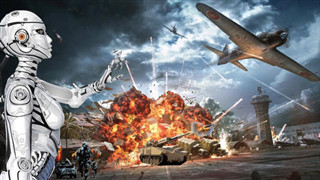
By Dr.Yuan Yi
AI has become an important military technology that may exert leading, subversive and strategic influence in the future, and military intelligentization is the new approach for major countries to seek strategic advantages and inter-generational military superiority.
All the five core technologies included in the US-proposed “Third Offset Strategy” are based on artificial intelligence, or AI, in the attempt to maintain its starter’s position and edge in military applications. In August 2016, the Defense Science Board (DSB) under US Department of Defense (DoD) released a report saying that independent technological development is at a critical point of making breakthroughs, and it must be translated to combat applications more quickly. Russia, highlighting the intelligent and unmanned technology innovation in the next 20 years, focused on the military application of cutting-edge technologies such as AI. Developed countries like Japan, Germany, the UK and France have also taken measures to promote intelligent military development.
While major countries in the world are competing in military intelligentization, the absence of international rules in this area has caused widespread concerns. Formulating relevant international rules and putting AI’s military applications in a controllable “cage” has become an important topic on the agenda of international military consultations and cooperation.
Formulating international rules is necessary for guiding the healthy development of military intelligentization. A look at the human war history tells us that a new military technology or related weapon equipment, if going unchecked, may open a “Pandora’s box”. The abuse of landmines, bio-chemical weapons and cluster bombs has caused tremendous damages to the mankind, and the formulation of international rules like the Law of War can restrict their abuse. For instance, the international community has worked long and hard to put in place the Treaty on the Non-Proliferation of Nuclear Weapons, commonly known as the Non-Proliferation Treaty or NPT,and other rules, so that nuclear weapons will play a more deterrent than combatant role. The formulation of relevant international rules should be expedited in order to guide the rational and healthy development of military intelligence, keep it from going stray like bio-chemical weapons and other anti-human ones, and control the security risk of military intelligence on a low level.
In formulating relevant international rules, we should focus on key areas of military intelligence security. AI can empower and augment military strength across the board, covering reconnaissance, command and control, fire strike, information combat, and overall guarantee. The rules should be focused on high-intelligence assault weapons targeting humans or manned platforms. As weapons become more intelligent and automated, the power of conducting reconnaissance, making judgment and decisions and taking actions will be gradually transferred to intelligent weapons. However, if we hand over the right of firing at humans or manned platforms to the ice-cold weapons, mistaken or indiscriminate killing that is both unethical and immoral will be highly probable. That’s the main risk of intelligent military development, which has to be reined in through the formulation of international rules.
In formulating relevant international rules, major countries should bear main responsibilities and push the formulation because their militaries are the leaders in military intelligentization and the main developers and users of intelligent weapons. They should also take the lead in setting up international organizations of AI arms control and carry out institutional designs such as agreement framework and discussing rules. In the course of intelligent military development, a major country will establish a good image for itself if it launches the international initiative of not developing or using high-intelligence assault weapons and takes the initiative to commit to it.
In formulating relevant international rules, developing countries can also take a part. Troops in most developing countries are in the stage of mechanization and far away from completing informatization, so they won’t be able to lead the future intelligent military development. However, these countries are usually the test field of advanced weapons and the victims of anti-human weapons. They, leveraging the UN, multilateral cooperation mechanisms and international forums, should actively discuss, call for and participate in the formulation of relevant international rules on military intelligentization and jointly cope with the new challenges it poses to international order and world peace.
(The author is from the War Studies College at the Chinese PLA’s Academy of Military Sciences)













